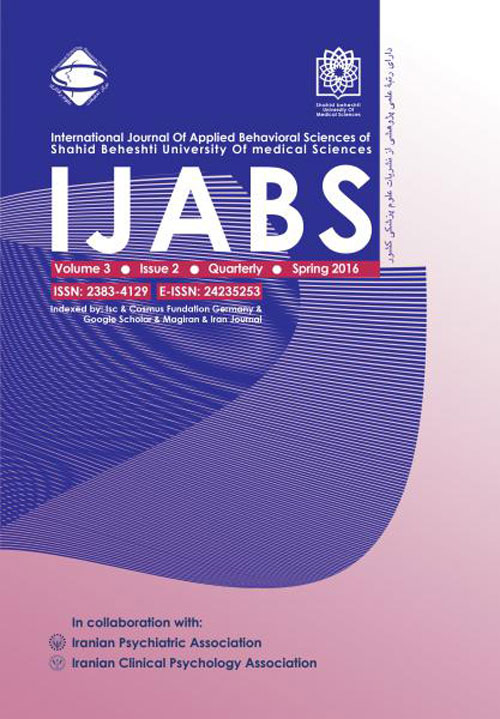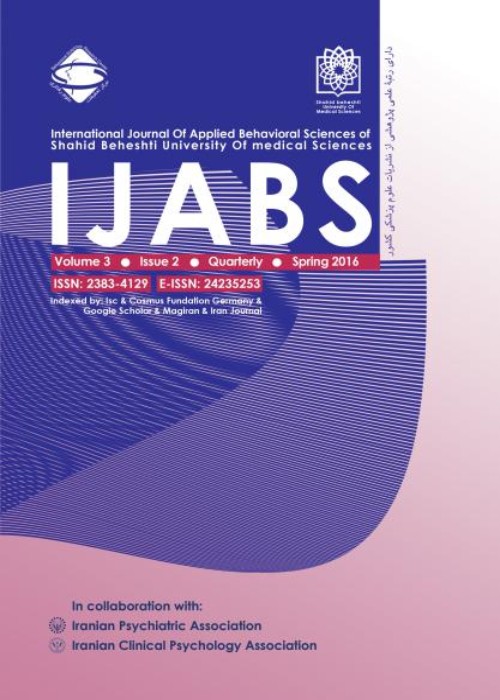فهرست مطالب

International Journal of Applied Behavioral Sciences
Volume:3 Issue: 3, Summer 2016
- تاریخ انتشار: 1395/07/30
- تعداد عناوین: 7
-
-
Pages 1-8IntroductionChronic Pain is a common and debilitating condition that little effort has been made to understand, diagnose and treat it. Previous studies have shown the role of psychological and personality disorders in maintaining chronic pain. The aim of the present study is prediction of pain based on trait and state dimensions, personality characteristics among patients suffering from chronic pain.MethodsThis study is a correlation study. 230 patients suffering from chronic pain were selected by convenience sampling among pain clinics of Shiraz city. Data were gathered by Demographic Questionnaire, Brief Pain Inventory (BPI), Temperament and Character Inventory (TCI, Cloninger) and NEO Brief Questionnaire (60 questions) and were analyzed using multiple regression (stepwise regression), Pierson`s Correlation Coefficient and SPSS18 software.ResultsThe results indicated that components of harm-avoidance and self-transcendence in pain severity, components of harm-avoidance, reward-dependant and self-transcendence in pain interference in daily routines were able to predict chronic pain positively. Also, from Big Five factors of personality, neuroticism was a positive predictor of pain.ConclusionThe results show that mood features and personality characteristics influence on pain maintaining and severity in patients suffering from chronic pain.Keywords: chronic Pain, temperament, character dimensions, personality features
-
Pages 9-14BackgroundThe term resilience is used in mental health to describe a persons capacity to cope with changes and challenges, and to bounce back during difficult times. Good problem-solving and decision making skills help young people to think abstractly, reflectively and flexibly.ObjectivesThis study aimed to determine the effectiveness of educating problem solving skills and decision-making on mental health and resilience of female university students.
Material andMethodsIt was done through a quasi-experimental design with pre-test - post-test and control group. The sample consisted of 30 university students who were selected by convenience sampling and randomly assigned into experimental and control groups. The experimental group was trained in problem solving and decision-making for seven sessions of 2 hours. The assessment tool consisted of Ryff scales of psychological well-being (RSPWB), Symptom Checklist (SCL-25), and Connor-Davidson Resilience scale (CD-RISC). Data were analyzed by analysis of covariance.ResultsThe results showed that educating problem-solving and decision-making skills increased mental health and resiliency of female university students (p≤.05).ConclusionIt can be concluded that educating problem-solving and decision-making skills can promote mental health and resiliency and can be effective in preventing the incidence and severity of mental health problems.Keywords: Resiliency, Mental Health, Problem solving, decision making skills -
Pages 15-22IntroductionEmploying mindfulness-based intervention in diverse areas of children, adolescents and families mental health is growing increasingly. This method, it seems, could be a unique option in controlling parent-child/adolescent conflicts in the families of adolescents with attention deficit/hyperactivity symptoms and externalizing problems, regarding its effect on the capacity of empathy and emotion regulation, as well as executive functions. Here we examine the efficacy of mindfulness-based intervention for adolescents with attention deficit/hyperactivity symptoms and externalizing problem on reducing mother-adolescent conflict.MethodsChild behavior checklist (CBCL), Youth self-report (YSR) of Achenbach system of empirically-based assessment (ASEBA) and parent-adolescent conflict questionnaire (PACQ-A) was administered to a sample of 253 adolescent-mother dyads who accepted the project invitation. 24 adolescents who scored borderline in attention problem subscale, high in externalizing problems scale of CBCL and PACQ-A, and their scores had been confirmed in youth self-report, were chosen and randomly assigned to two experimental (n=12) and control (n=12) groups. The experimental group received 8 weekly mindfulness-based intervention sessions, each taking 2 hours. The adolescents of the control group did not received any intervention for the same duration. Quantitative data were analyzed using multivariate analysis of variance (MANOVA).ResultsThe experimental group showed a significant reduction in frequency and intensity of conflict, as compared to control group. The multivariate Ƞ2 based on Wilks's Λ was strong, 0.44.ConclusionThe results provided additional and promising evidence for the efficacy of the mindfulness-based intervention in reducing the mother-adolescent conflict in the family of adolescents with attention deficit/hyperactivity symptoms and externalizing problems, and may be of practical importance in management the home-conflict in these high stress families.Keywords: Mother–adolescent conflict, Attention deficit-hyperactivity symptoms, Externalizing problems, Mindfulness-based intervention
-
Pages 23-29IntroductionTo projects, substance dependent individuals have problem in thinking. Drug dependence is Chronic and recurrent phenomenon with serious harm to the physical, financial, social and family along. The aim of present study is comparison of the problem solving style and abstract thinking in men undergoing methadone maintenance treatment (MMT) and normal men.MethodsEx post facto method was used on 60 men undergoing methadone maintenance treatment (MMT) and 60 normal men from addiction treatment clinics in Shiraz who were selected through judgmental convenient sampling. The instrument was the problem solving style questionnaire and the Wisconsin Card Sorting Test. The findings were analyzed through Student t test using SPSS version 21.ResultsResult showed that the difference between two groups in approach style and creative problem-solving style, sorting piles and preservative errors. There are no difference between two groups in helplessness, problem-solving control, problem-solving confidence and avoidance style.ConclusionData analysis showed that men undergoing methadone maintenance treatment (MMT) have problem in problem solving and the abstract thinking, So clinical psychologists should pay attention cognitive factors in treatment substance dependent individuals.Keywords: problem solving style, dependence of substance, methadone maintenance treatment (MMT), normal subjects
-
Pages 30-38Introduction Compassion-focused therapy was developed to aid individuals with high levels of shame and self-criticismMethodsThe research method was quasi-experimental study having pretest-posttest-follow-up (PPF) designs with control group. Statistical society of this research included all juvenile delinquents with self-harming behaviors resided in Tehran Correction and Rehabilitation Center in 2016. 44 self-harming juveniles (24 in experimental group and 20 in control group) constituted the studied sample. The Inventory of statements about Self-Injury, Klonsky and Glenn, (2009), was used for data collection in pretest, posttest and follow-up stage. After the pretest, the experimental group was treated using compassion focused therapy (CFT); this treatment program was held in eight 90-mintue sessions twice per week. Due to the drop in subjects,13 of the experimental group and 9 of the control group completed the questionnaire in follow-up stage). In order to analyze the data, covariance analysis was used in addition to descriptive statistical methods..ResultsThe results of this research showed that CFT has been effective on reducing self-harming behaviors of delinquent juveniles in follow-up stage (p=0.001Conclusionwith respect to the effectiveness of the compassion-focused therapy at the follow-up phase in this study, as well as the effect of self-compassion practices over time (accumulation effect), it seems that the compassion-focused therapy has been effective in learning to regulate negative emotions and as a result, breaking the subjects resistance against the fear of compassion.Keywords: compassion focused therapy (CFT), self-harming behaviors, juvenile delinquent
-
Pages 39-46IntroductionThe Spiritual intelligence represents a different set of skills and abilities, each of which forms appear different in social and historical contexts. And it maybe used to promote optimism and happiness.The present study was designed to investigate the relationship between spiritual intelligence, optimism and happiness on Iranian university students.MethodsOne hundred and fifty students (89 men and 61 women) were selected using cluster sampling and were asked to complete Scheirer and Carver's Life Orientation Test-Revised (LOTR), King's Spiritual Intelligence Self-Report Scale (SISRI) and Argyle, Martin, and Crossland's Oxford Happiness Inventory (OHI). Data were analyzed using t-tests and Pearson correlation coefficients and regression analysis.ResultsResults of the current study provide additional evidence that based on spiritual intelligence can predict happiness and optimism. There was a significant relationship found between total spiritual intelligence scores and optimism (r =0.219 p > 0.05). Also, Stepwise regression showed that when happiness and spiritual intelligence were entered in the equation, coefficient of determination (R2) was 0.26. This means that happiness alone explains 26% of the total variance for spiritual intelligence.ConclusionResults of the current study provide additional evidence for the role of spiritual intelligence between students. In the other words, the findings of the present study supports the role of spiritual intelligence in anticipation of optimism and happiness in students. On the other hand, by holding workshops to increase student's spiritual intelligence, can promote two behavioral features of happiness and optimism in them as well. Declaration of Interest: NoneKeywords: Happiness, optimism, spiritual intelligence
-
Pages 47-51Nowadays obesity It is an important factor in onset of disease and early mortality followed by personal and social consequences. One of the effects of the obesity is its impacts on quality of individual's life while some studies proved that Binge eating disorder affects obesity consequences. So in this cross sectional study, among all of clients to obesity clinic Sina Hospital with sampling health- related quality of life61 obese women with binge eating disorder was compared with those of 74obese women withoutbinge eating disorder through performing sf-36 questionnaire and the results were analyzed by using independent t-test. Results showed that in six subscales of health-related Quality of Life, the group of women without binge eating disorder ranked over those women with binge eating disorder. Parallel to weight loss in obese and overweight people and due to its impacts on the consequences over the obese people, it seems necessary to equally focus on the treatment of binge eating disorder simultaneously.Keywords: Health- related quality of life, Obese women, Binge eating disorder


